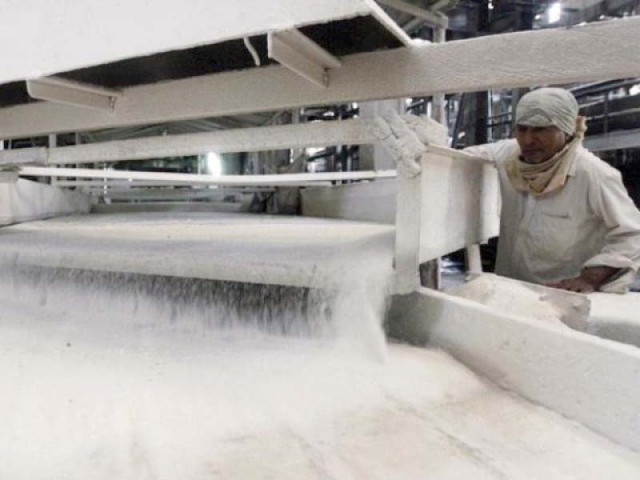Punjab forces mills to sell sugar to unregistered persons
FBR spokesperson says district admins cannot waive condition of ST registration

The Punjab government has waived the condition of registration of sugar dealers with the Federal Board of Revenue (FBR) and is forcing the mills to do business with unregistered persons that may land the millers in jail.
The orders have been issued by the district administration dealing with the sugar mills. The Jhang district administration has issued the orders to waive off the condition of the sales tax registration for the sugar dealers, according to a letter seen by The Express Tribune.
While making reference to a court judgment, the district administration authorised four dealers to lift sugar from the mill. “The condition of sales tax registration number is waived off due to urgency of sale of sugar in Ramazan Bazars, which has been established from 25 Shaban,” reads the April 10 order of the district administration.
However, the judgment that the district administration has cited in the letter does not mention waiving off the condition of the sales tax registration. The interim order of the Lahore High Court only mentions the fact of fixing the sugar price at Rs80 per kilogramme to sell 155,000 metric tons of the commodity to the provincial government for Ramazan bazars.
“The district administration cannot waive off the condition of sales tax registration of the dealers,” FBR spokesman Syed Nadeem Rizvi said. In case of non-registration, the input tax of the sugar mills would legally become inadmissible in proportion to the sales made to the unregistered persons, he added.
Under the benami law, any sale made to unregistered persons will be treated as benami and such sale proceeds will be liable to confiscation. In case the benami possession is established, the courts can award the accused rigorous imprisonment of up to 7 years or a fine equal to 25% of fair market value of the property.
The provincial government’s desperate moves are not helping the consumers. The sugar mills are currently under microscope due to their cartel-like behaviour. The sugar price in the country has massively increased due to ill-timed exports by the PTI government, increase in sales tax and cost of doing business.
The price of a 50-kg sugar bag shot up to Rs5,200 or Rs104 per kg in the wholesale market in Rawalpindi on Tuesday, according to a retail dealer. The wholesalers were also selling the sugar in very limited quantity. The commodity is sold at Rs110 in the retail market.
The Pakistan Sugar Mills Association (PSMA), Punjab Zone, has already taken up the issue of delivery of sugar to dealers without appropriate documentation by the Punjab government with the FBR chairman.
Sugar mills of Punjab have been directed by the deputy commissioners in the province to deliver 155,000 metric tons of sugar to the designated dealers at a fixed rate of Rs80 per kg for the holy month of Ramazan, according to a correspondence between the FBR and the PSMA.
“The dealers being registered and referred by Deputy Commissioners in Punjab to various mills do not have the requisite documentation i.e., National Tax Number and Sales Tax Registration No. etc. Sugar mills are oppressive to execute delivery in the absence of valid registration as FBR views such transactions as ‘Benami’,” according to the PSMA letter
It added that the district administration was adamant to lift sugar forcefully in compliance to instructions of the government. Under the circumstances, sugar mills are not in a position to adhere to guidelines provided by the FBR. “We hope sugar industry will not be reprimanded for the actions of the state if any omission takes place in the process”, warned the millers.
The sugar industry has also sought relaxation in payment of due taxes on the ground that selling sugar at Rs80 per kg could choke their financing pipelines. It said that as against ex-mill fixed price of R80 per kg, the actual sugar price comes to Rs104 per kg.
Interestingly, the Punjab government is also forwarding names of dealers for supply of sugar at Rs80 per kg, who do business in posh sectors.
The anti-trust watchdog has opposed the Punjab government’s decision to fix sugar price and cautioned that the move may backfire and cause hoarding, further escalation in the price and smuggling to other provinces.
“When regulations consistently fail to achieve their desired objectives of fair prices and competition, it is perhaps prudent to reconsider them – even scrap them,” advised the Competition Commission of Pakistan (CCP), while urging the province to reconsider the decision of fixing the price.
Consumers of the food items are also facing another problem – supplies of expired goods being sold at the outlets. The Overseas Investors Chamber of Commerce and Industry has recently raised this issue with the commerce ministry.
The problem is arising due to sale of smuggled goods. The government had issued a statutory regulatory order (SRO) in February 2019 to curtail the smuggling and parallel trade. SRO requires that all imported food products should have 66% of shelf life at the time of import.
However, majority of these products that are available for consumers are not compliant to the requirements and the SRO has not been implemented at the retail level by any government authority, leaving the opportunity for illegal/smuggled products to be sold for indefinite period, according to the OICCI.



















COMMENTS
Comments are moderated and generally will be posted if they are on-topic and not abusive.
For more information, please see our Comments FAQ